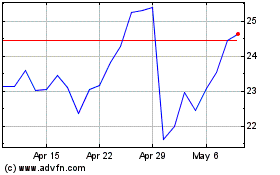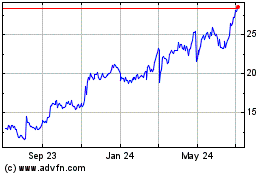US Education Dept Softens Final Rule On Vocational Programs
June 02 2011 - 12:31AM
Dow Jones News
The U.S. Department of Education on Thursday will release the
final version of its much-awaited "gainful employment" rule that
punishes career-training programs for graduating students with
heavy debt loads.
The rule, one of the most controversial to come out of that
office in years, is an effort to ensure the programs are preparing
students for legitimate jobs. This final version is less severe
than a draft released last summer, giving programs more
opportunities to right themselves if they run afoul of the
measure.
To qualify to receive federal student aid, a program now must
pass one of three tests: at least 35% of former students are paying
down their loan balances by at least $1, or a typical graduate's
loan payment doesn't exceed 30% of his or her discretionary income
or 12% of total earnings. The rule applies to most for-profit
programs and certificate programs at non-profit and public
institutions.
Previously, the department proposed a three-tier system.
Programs were safe with a repayment rate above 45%. They fell into
a danger zone with rates between 35% and 45%, and either graduate
debt burdens above 8% of total income or above 20% of discretionary
income. They would lose eligibility entirely if they had repayment
rates below 35%, graduate debt payments above 12% of total income
and above 30% of discretionary income.
The new criteria will go into effect July 1, 2012. Programs must
fail the debt measures three times in four years before losing
access to the funds, meaning no programs would lose eligibility
before 2015.
"We're giving career colleges every opportunity to reform
themselves but we're not letting them off the hook, because too
many vulnerable students are being hurt," Education Secretary Arne
Duncan said.
The final rule is being released after a months-long delay, amid
strong opposition from the for-profit college industry. The
Education Department received more than 90,000 comments on last
year's draft proposal.
Many for-profit college companies, such as University of Phoenix
operator Apollo Group Inc. (APOL) and ITT Educational Services Inc.
(ESI), derive upwards of 80% of their revenue from students'
federally guaranteed financial aid. Programs with low tuition, such
as those offered by American Public Education Inc. (APEI) are
expected to fare better than those that require students to take on
significant debt. Schools that offer programs in subjects like
culinary arts and design, many of which lead to low-paying jobs,
may also suffer.
"We're asking companies that get up to 90% of their profits from
taxpayer dollars to be at least 35% effective," Duncan said.
For-profit colleges have faced heightened criticism in the past
year regarding their academic value, as program graduates default
on their loans at alarming rates. While 12% of all students attend
for-profit colleges, their graduates contribute more than 40% of
all defaulted federal loans.
According to Department of Education calculations, 18% of
for-profit programs are expected to fail the debt tests at some
point, with 5% ultimately losing eligibility. Across all
institutions, those figures are 8% and 2%, respectively.
Though scheduled to take effect next summer, the rule likely
won't be instituted without a fight. Schools have aggressively
opposed the measure, with lobbyists alleging the Education
Department was unjustly swayed by short-sellers with a financial
interest in seeing the publicly traded school operators suffer.
They also say the rule will limit access to higher education,
particularly for minorities. A handful of lawsuits are currently
pending on issues related to the rule.
The Education Department in October released the majority of a
rules package governing higher education, addressing issues such as
the measure of a credit hour and incentive compensation for
recruiters. Those rules take effect July 1. Parts of the gainful
employment rule, related to the disclosure of graduation rates and
information about student debt loads, will go into effect then as
well.
Stocks of some for-profit colleges rose late yesterday in
anticipation of the new rule, which, if not softer than the earlier
proposal, was expected at least to give some certainty to the
sector. Shares of Career Education Corp. (CECO) closed up 6.4%, to
$22.87, while Apollo Group rose 2.6%, to $42.19.
-By Melissa Korn, Dow Jones Newswires; 212-416-2271;
melissa.korn@dowjones.com
CECO Environmental (NASDAQ:CECO)
Historical Stock Chart
From Mar 2024 to Apr 2024

CECO Environmental (NASDAQ:CECO)
Historical Stock Chart
From Apr 2023 to Apr 2024
